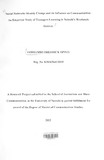| dc.description.abstract | This study set out to investigate the influence of social networks identity change on online communication. The target population was to be teenagers who mainly school in private Schools of Westlands District of Nairobi. The initial assumption of the researcher was that the teenagers are highly involved in online identity change. The choice of teenagers who school in private schools Westlands District Westlands was equally based on the assumption that the living standards of this group offers them an opportunity to have the required gadgets for online communication. The study was to find out the types of online identity choices these teenager make, the reasons behind these choices of identity and finally to find out if the type of online identity choice influences online communication.
The ex post facto research design was used in the study. Questionnaires, interviews and Focused Group discussion were the main means of data collection. Purposive sampling was used where three private schools in West lands District were identified. Having collected the data, the authenticity of the same was verified after which the data was analysed through descriptive data analysis. Responses to open ended questions were coded after which content analysis was done.
From the data analysis, it was confirmed that online identity type influences online communication. People tended to be willing to communicate more with online contacts that they could identify. Those who kept changing online identities had few people willing to talk to them while those who were anonymous equally received minimal communication. Interestingly, those who have changed their online identities were deemed to be doing a lot of online communication. Another interesting bit was that most online users knew less than a half of their online friends.
From the findings the key recommendation made was that the power of online communication cannot be wished away and the authority figures should play more active role in guiding the teenagers on effective usage of SNSs rather than castigate them. Equally, due to their nature of interactivity, wonderful teaching methods could be designed to make them more fruitful. Another study could be carried out in other locations, or using another age group or even another social networking site to find out if these findings could be replicated. | en_US |

